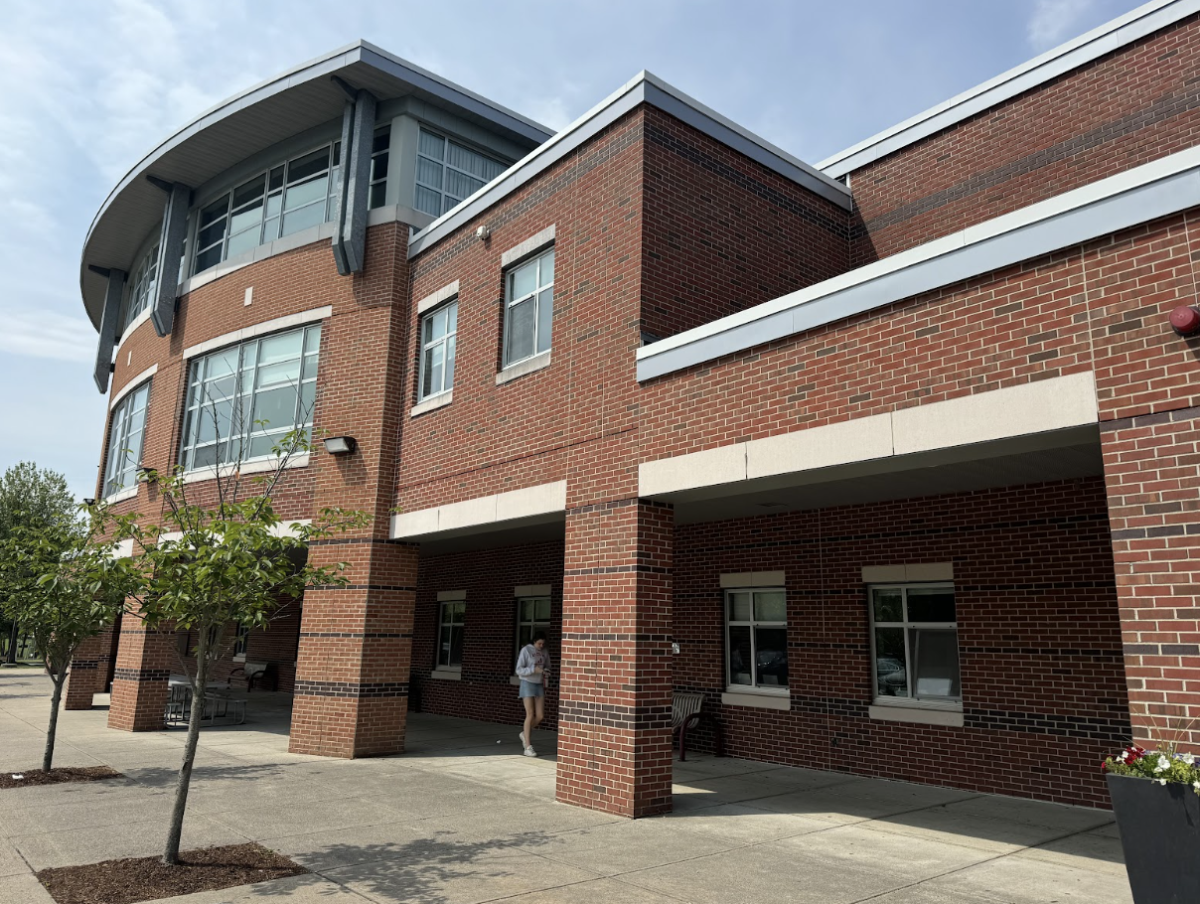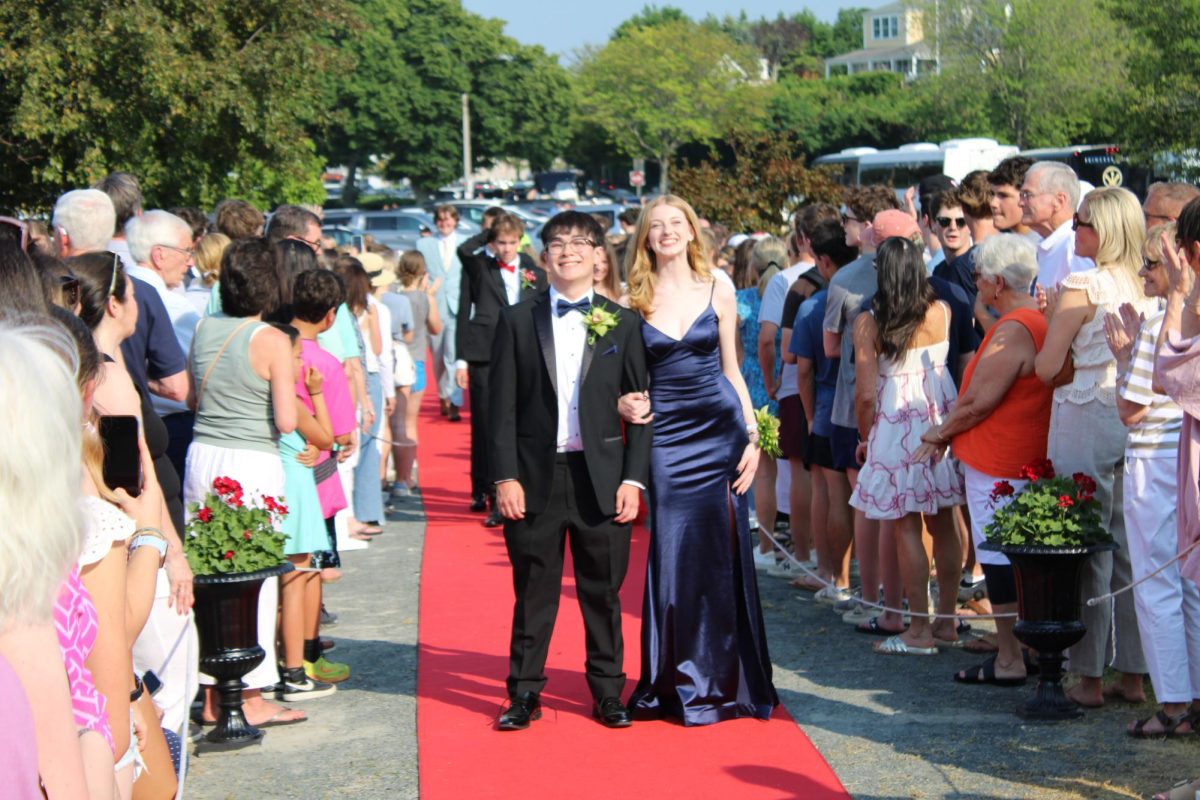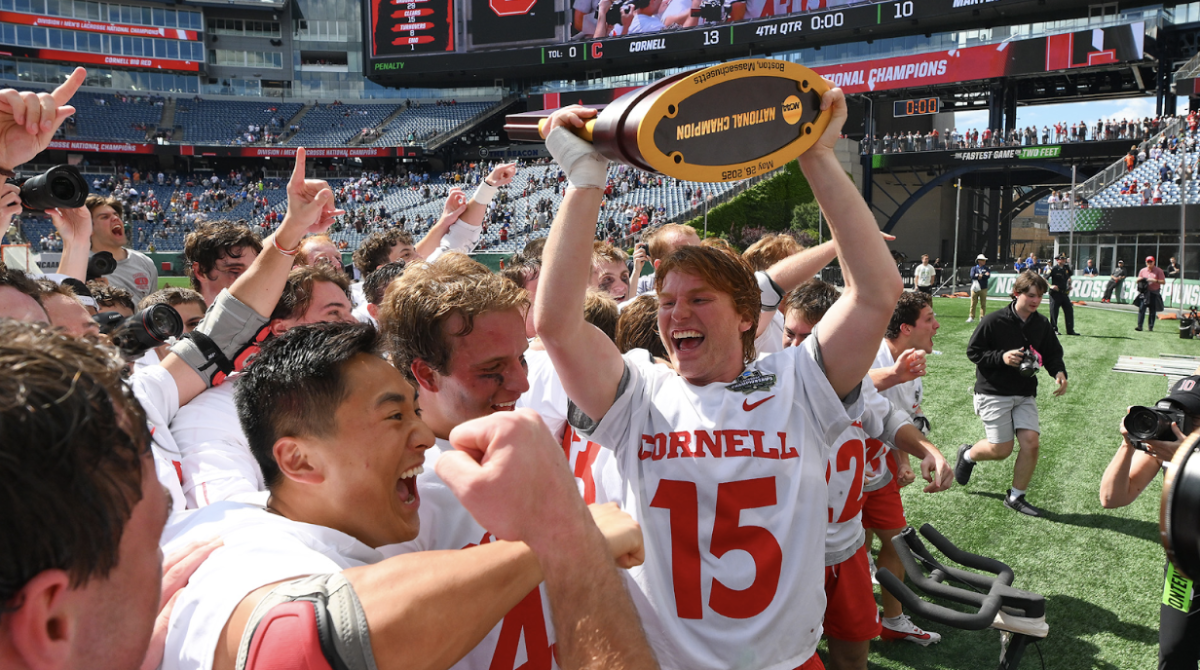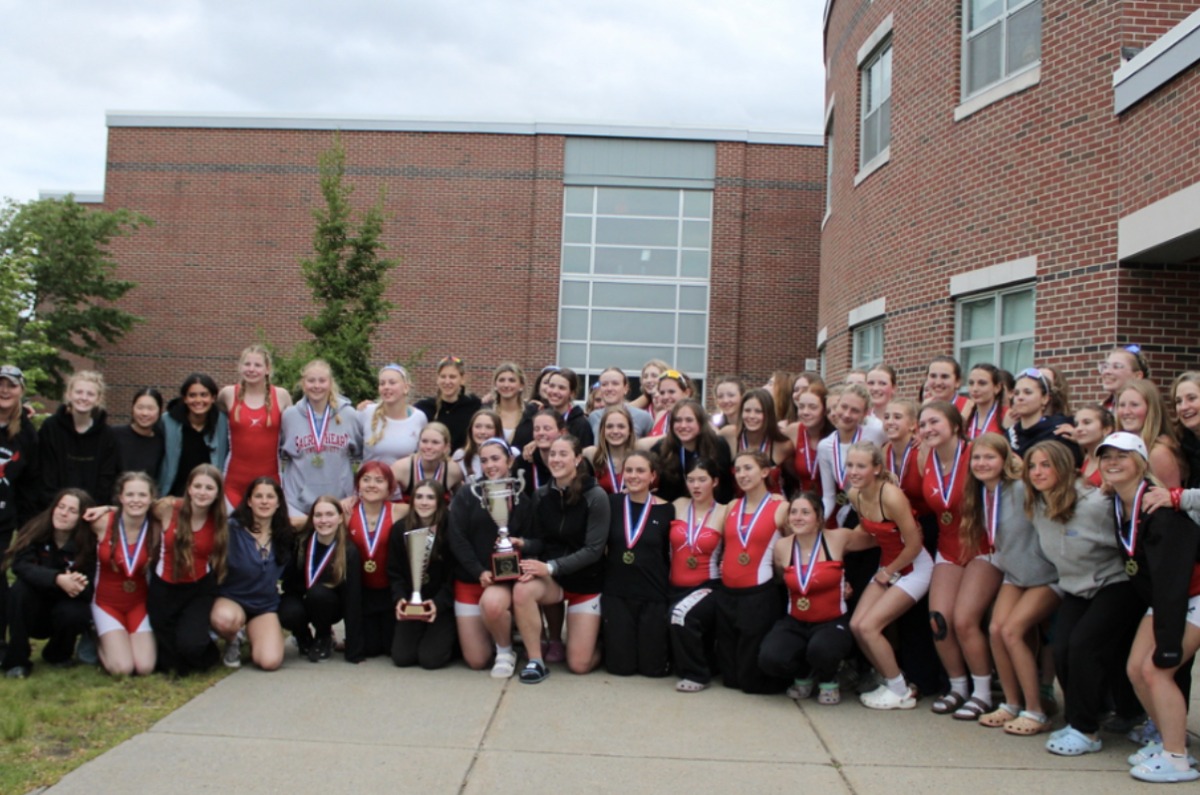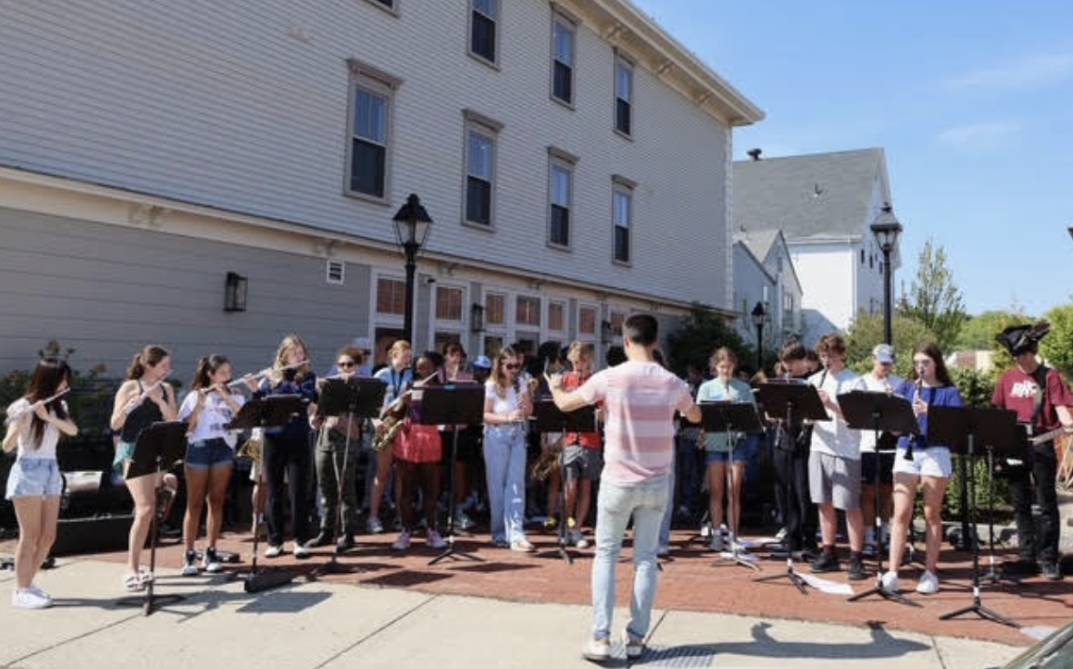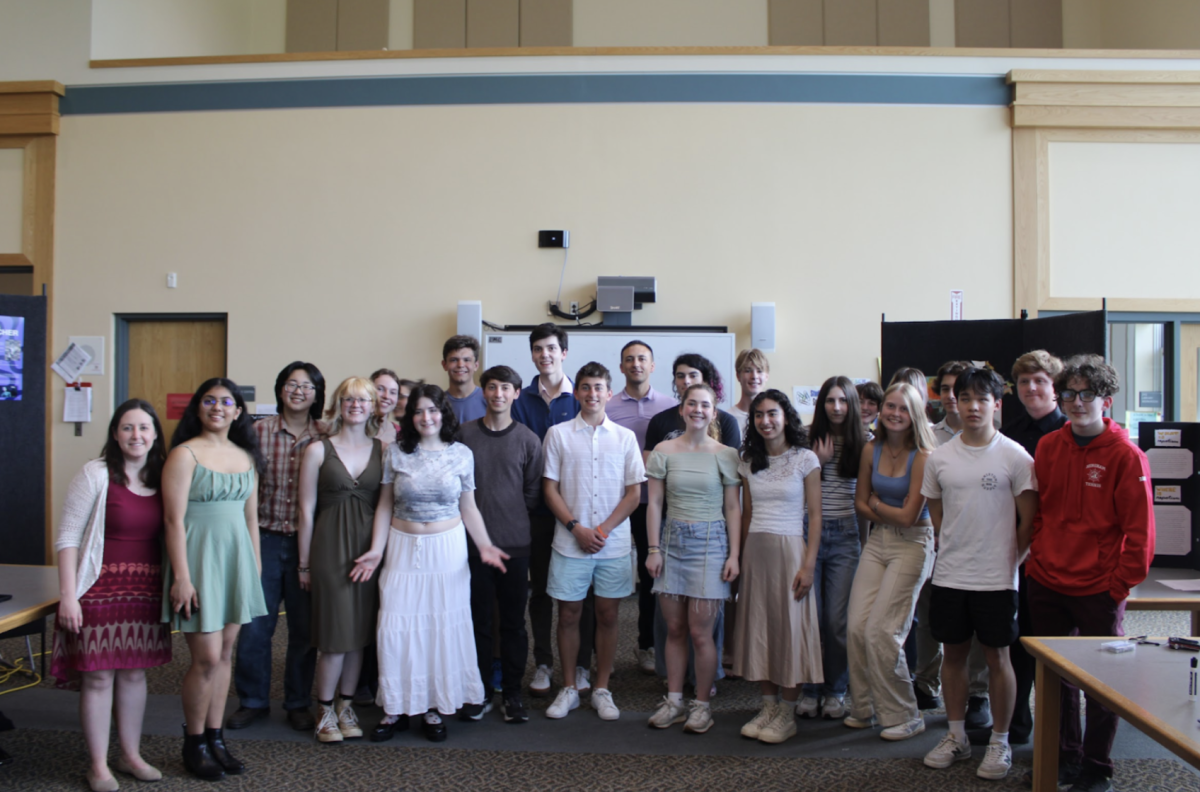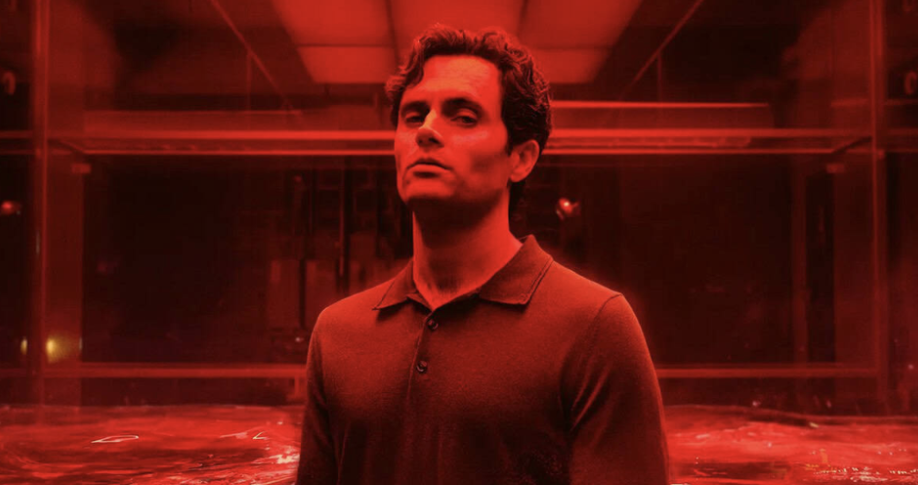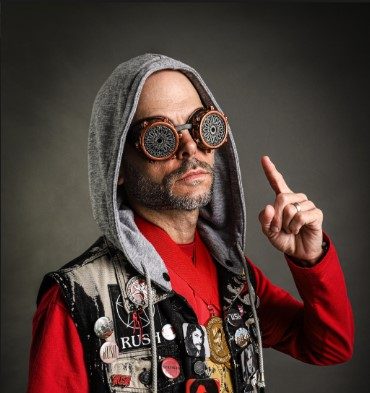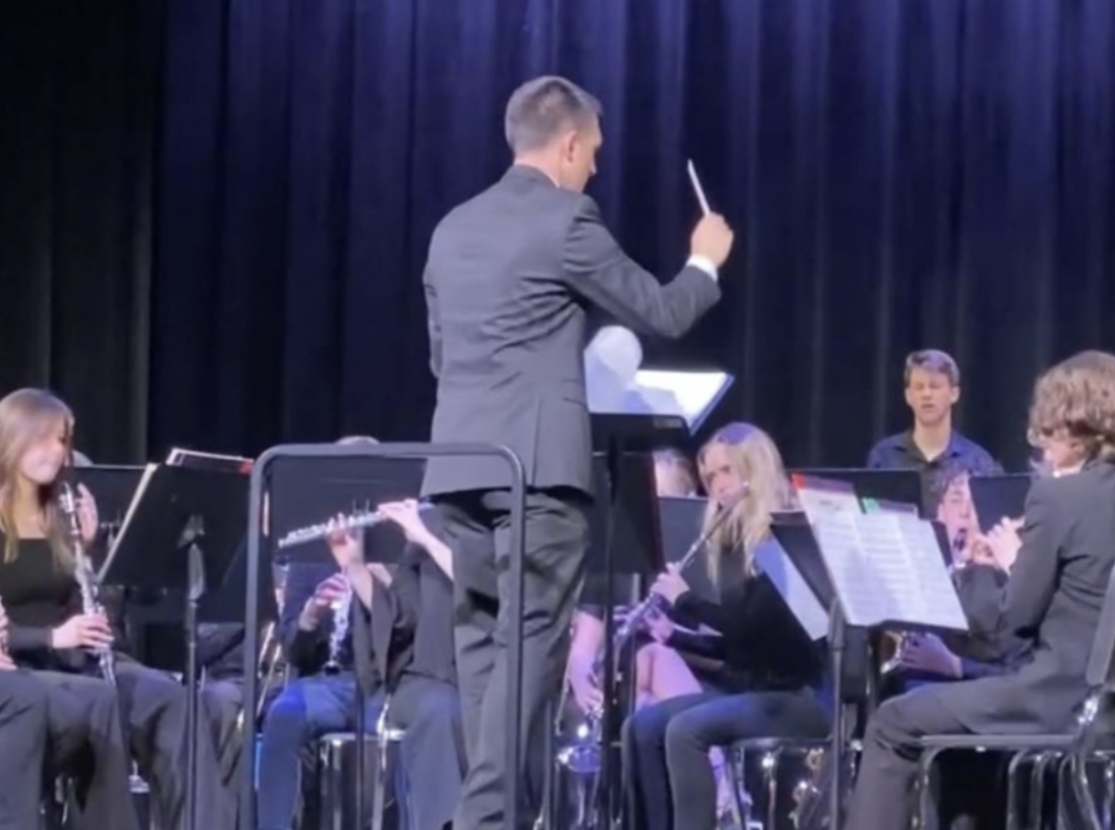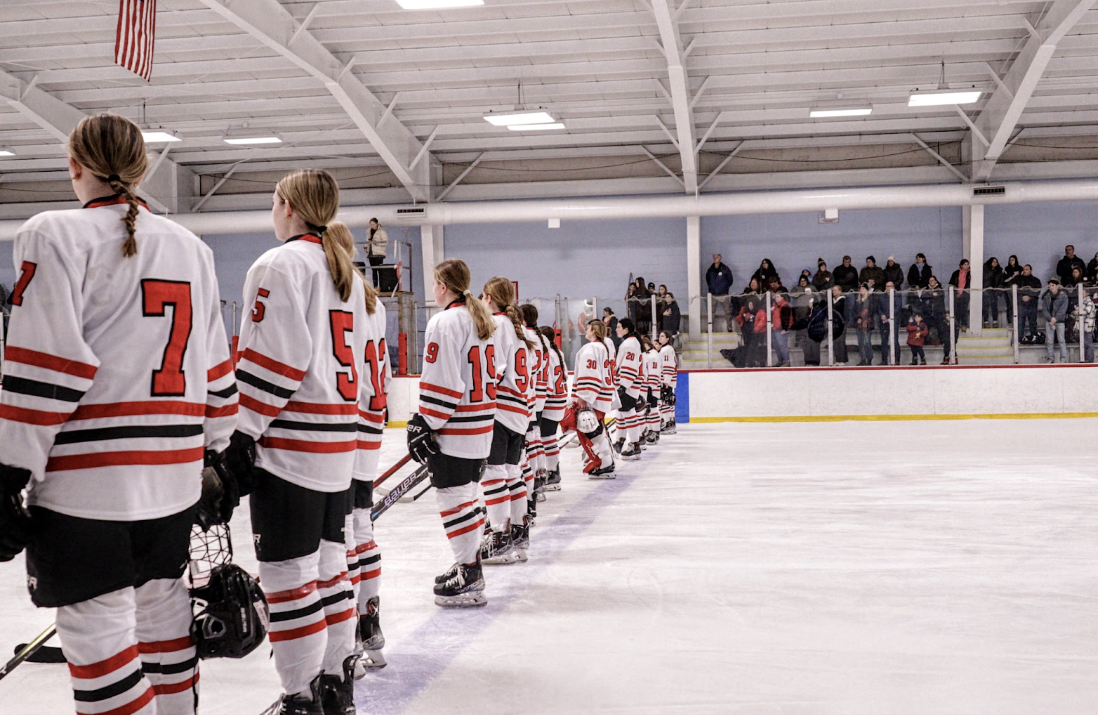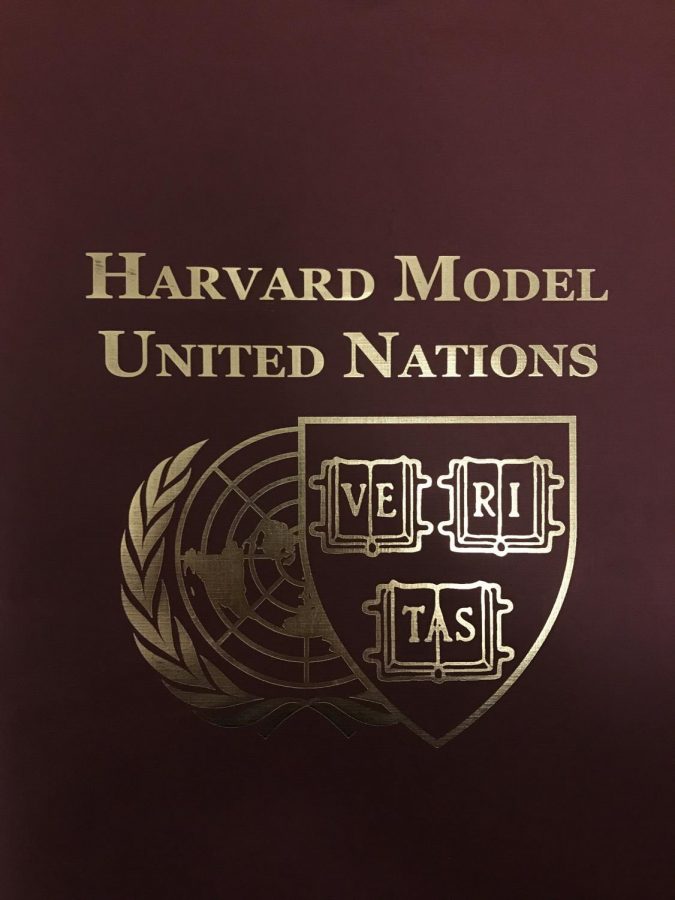2018 Harvard Model United Nations: My Experience
The folder given to each delegate, in which we stored important papers such as our busy schedules.
January 30, 2018
While walking out of class on the afternoon of Thursday, January 25th, 19 students including myself were buzzing with nervous excitement. Being dismissed from school is always a highly anticipated event, but the exhilaration that comes with being dismissed specifically to attend the Harvard Model United Nations is truly something special.
The bus ride to the Sheraton hotel in Boston, connected to the Prudential Center, was comprised of lively chatter of the days to come. My friend Catharine Denning and I spoke animatedly and sang loudly to the songs playing through the speakers of another student. We both attended the conference last year, and were particularly excited for this year, having already known what was to come.
The Harvard Model United Nations trip, or HMUN, is a highly anticipated event for Hingham High students who are apart of the Model UN club at school. Every January, around 20 or so students are selected to attend the conference alongside history teachers Mrs. Black and Mr. Kirkauldy based on how much dedication the student showed to the club throughout the school year.
Every participating school is given a country or two to represent in the mock conferences. Last year, we represented Nigeria. This year, Hingham High School participated as the delegation from Somalia, all 19 of us proudly sporting pins depicting the Somali flag.
After the anxious bus ride, we all arrived at the Sheraton. The lively spirit of Model UN greeted us the second we walked into to the lobby. Thousands of kids from tens of countries dressed in their best business attire covered every inch of the hotel. We quickly got to chatting with some of these students, already eager to make new friends.
Not too much later, Mrs. Black presented us all with our room keys, our placards, and our nametags. Our placards all read “Somalia” and were very crucial for us to take care of during our time at the conferences–during every single conference, all delegates needed to use their placards to take attendance, raise motions, or speak.
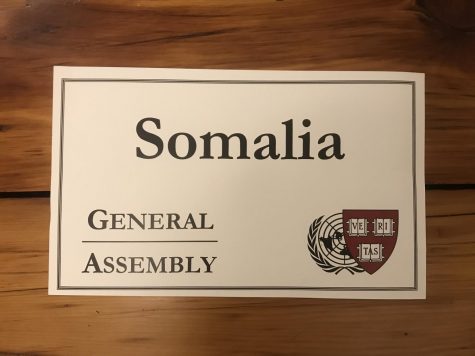
Our placards for Somalia, which we raised every committee session to take attendance, to raise motions, or to do anything else it was needed for..
The name tags were also precious possessions during HMUN; every one read the country the delegate wearing it represented, the delegate’s name, the delegate’s specific committee, and the delegate’s high school. Apart from being mandatory to wear always, the nametags also helped to spark conversation amongst delegates.
Once we all settled in, got some lunch, and changed into our conference-ready clothes, all 3,000+ delegates and their advisors filed into the cavernous Hynes Convention Center in the Prudential Center for the opening ceremonies. At these ceremonies, the Harvard students who worked tirelessly to organize and perfect this year’s Model UN addressed the crowd before introducing the keynote speaker.
This year’s keynote speaker was a highly accomplished woman named Ann Cotton. Cotton is the founder and president of Camfed International, an organization that strives to advance the education of girls in Africa who are often denied access to education due to poverty.
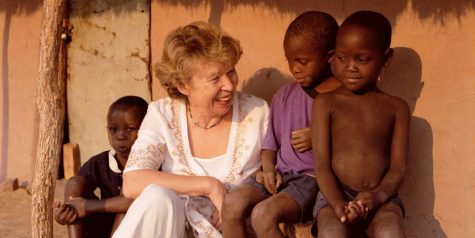
Ann Cotton of Camfed International smiling with some of the children she met during one of her trips to Africa.
Cotton shared anecdotes from her own personal experiences with education as well as those of the girls she has helped achieve dreams beyond their wildest imaginations. She reminded us all to not only think of each other in the coming days, but to acknowledge the fact that many promising students were not with us due to obstacles such as poverty.
After Cotton, the 2018 HMUN’s charity was addressed. Every year, HMUN partners with a charity. Throughout committee sessions, delegates pass around envelopes and fill it with money for the charity. I know myself and many of my fellow Hingham students put quite a lot of money towards this year’s charity: Save the Children.
Bringing a cheerful close to the opening ceremonies was a performance by the Harvard Lowkeys, Harvard University’s A cappella group. After this, thousands of people began shuffling out of the convention center, eager to grab a quick dinner before the first committee session of the conference.
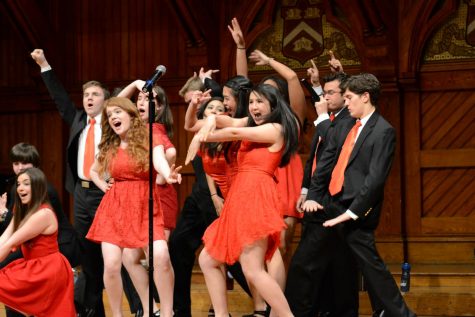
Members of the Harvard Lowkeys performing.
Unfortunately, one of the only complaints I have with HMUN has to be with the meals: trying to find a place to eat while thousands of other people are attempting to do the same is not an easy feat.
Oftentimes, the lines are too long to grab anything in time for a conference, or we needed to leave the Prudential Center and face the biting cold of New England in January in order to find a place to eat. However, Boston is surely no stranger to good food, so, in the end, it was worth it.
After the short break came time for the first committee session. My friend Catharine and I were in a double delegation, meaning two delegates attended on behalf of the same delegation. As representatives of Somalia, Catharine and I spent this year’s HMUN in the United Nations Office on Drugs and Crime committee.
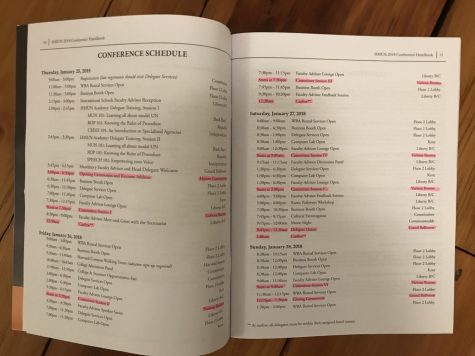
The busy conference schedule depicting the many events of the weekend.
All committees are run by a board of Harvard students. This makes the experience all the better, because many of the Harvard students once sat exactly where we did from January 25th to January 28th and knew how to keep the committees lively and fun. Some of the Harvard students were actually freshmen, meaning they were fresh out of HMUN and filled with ideas on how to better the experience for those of us still in high school.
Each committee is presented with a background paper detailing two topics before the actual HMUN begins. The various delegations typically spend the first committee session holding a lively debate over which topic should be the one addressed throughout the rest of the conference. This year, after many delegations, including my own, had a chance to speak, we came to the consensus that we would be debating Topic A, which focused on the opioid crisis sweeping the world.
Catharine and I were terrified to speak. When we went on the trip for the first time last year, we only spoke a grand total of one time. But we had been told so many times by upperclassmen that speaking only made the experience better, so we swallowed our fears and did it–we each spoke in the first committee session alone. And all of those underclassmen were certainly right. Being involved in the committee and the decisions made by it made the conference even more exciting, something I had previously not thought possible.
We were not the only delegates who possessed but overcame this fear–most of us felt the same. “Since it was my first HMUN, I was super nervous going into it. I swore I wasn’t going to speak in front of my committee,” reminisced Hingham High sophomore Schuyler Bordeau. “As soon as I got into my first meeting I realized how wrong I was.”
After the first committee session, which lasted from 7:30 pm – 11:00 pm for most committees, myself and most other delegates were pretty much exhausted. But one of the most exciting aspects of HMUN is the closely-monitored liberty we get to experience; to elaborate, we enjoy roaming the hotel and the Prudential Center under careful guard until curfew, allowing us to feel free but still immensely safe.
For example, after the busy afternoon, Catharine and I stopped by the Cheesecake Factory in the Prudential Center, accompanied by many other delegates with similar ideas, and took some pieces of cheesecake back to our room before getting ready for bed and watching a movie on Netflix. The whole scenario was certainly not a likely Thursday night in January for any high school student, which just added to the unique fun that is HMUN.
The next morning we were all very happy that we had the chance to sleep in. Seeing as many delegates hailed from countries such as China, England, Brazil, and more, these students did not have the opportunity to see Boston as much as us Hingham High students do. Therefore, HMUN specifically sets aside time during the conference for foreign delegates to tour colleges with their schools.
Since we can tour Boston colleges most any time, us Hingham students took this time to roam the area, getting breakfast and lunch, shopping, and conversing with other delegates. We also got to use this time to start drafting working papers.
In HMUN, there are a series of steps followed throughout the conferences that ultimately result in one goal: the passing of a resolution. Every motion in HMUN must be passed with the majority of votes, but the resolution must pass with ⅔ majority. Therefore, it is crucial that the various delegations find ways to agree over the course of the weekend.
The working papers are essentially step one in this process. At least in my committee, the moderators, who are all Harvard students, accepted a maximum of six working papers. This papers are basically very rough drafts of a resolution, detailing various plans to solve the crisis at hand. These six working papers are made by different blocs within each committee, which are formed by delegations with like-minded ideas.
By the start of our second committee sessions at 2:30 pm, the blocs being formed were becoming quite clear. After some more intense debate throughout this session which came to a close at 5:45 pm, there was a quick break for dinner until committee session three from 7:30 pm to 11:00 pm.
During the third committee session, our moderator, a Harvard senior named Danny, announced that working papers would be due at 9:15 pm. Throughout committee sessions, delegates can call both moderated and unmoderated caucuses. These can are motioned by a delegation and then all delegates vote on what will happen.
Moderated caucuses are caucuses in which the delegation who motions for them designates a time limit for the entire moderated caucus, a time limit for the speakers who ask to speak, and a topic for discussion. Unmoderated caucuses are also motioned for by a delegation, but a delegation need only designate a time limit; these caucuses are times when the committee splits up and delegates are free to speak with each other about the debates during the moderated caucuses, form blocs, and brainstorm resolutions.
During the unmoderated caucuses–called unmods for short–in the third committee session, five blocs became predominant: DREAM, CARE, R CUBED, GAP, and COP.
Each bloc had devised its own specific plan to combat the opioid crisis. While some of these papers resembled each other, others stood out in stark opposition.
Catharine and I became prominent members of the COP bloc. COP stood for Coalition of Powers. Our bloc was comprised of countries such as Somalia (ourselves), South Africa, Zimbabwe, Lebanon, Moldova, Colombia, and more.
Our entire objective was to focus primarily on the humanity behind the opioid crisis–we emerged as the most radical bloc of the group, calling for immediate and extreme response to the infringement of basic human rights that comes with the outlawing of opioids. We stirred great controversy but purposefully so; by doing so, we sparked great debate and forced our fellow delegates to speak on subjects they otherwise were ignoring.
Since we actually formed during this committee session, we had limited time to write a legitimate working paper to present. At 9:00 pm, myself and a few other delegates gathered to quickly write our paper, determined to follow through with out newly found inspiration. Somehow, someway, at 9:15 pm, I was emailing a finished–by no means perfect–and rather radical working paper to the moderators.
Once everyone reconvened, it was time to present the working papers. This was done by two delegates from each bloc presenting their working paper within a certain time limit and then three other delegates from the same bloc answering questions from delegations from other blocs.
Our presentation was last. After two delegates in my bloc presented, I found myself as one of the three delegates answering questions. Seeing as last year, when Catharine and I represented Nigeria in a committee regarding space colonization and thus did not have much to talk about, having acquired a much more significant role was quite intimidating.
But, as our bloc was rather radical, we brought some fun to the committee, and the questioning session went quite smoothly. When it was finished, my bloc and I breathed a sigh of relief. In about 15 minutes we had formed a bloc, written a working paper, organized a presentation, and became a relevant competing bloc in the committee. Despite the unconventional circumstances, we were really proud.
Soon the night was drawing to a close once again. Exhausted, delegates shuffled out of the conference rooms and fought their way into the elevators or the stairwells. Night two of the conference drew to another late close.
Unfortunately, we did not have the opportunity to sleep in the following morning. Committee session number four called for delegates to be present and voting at 9:00 am. This meant waking up at around 7:00 am in order to shower, dress, eat breakfast, and make it to the committee session on time.
Since the presentation of working papers had already occurred, the topic of this committee session could essentially be chalked up to merging. The moderators were only to accept no more or no less than two working papers, meaning the the five different blocs that had formed at that point needed to find a way to merge in some manner and become two.
After plenty more debate, tension between different blocs polarized the delegations. As time progressed, it became more and more clear as to what blocs could peacefully cooperate and what blocs were doomed to be enemies. DREAM and CARE formed a strong alliance and as did R CUBED and GAP.
At that point, a new issue came to fruition: neither of these merged blocs truly represented the ideals of my bloc: COP.
We had maintained our strong stance; the two newly merged blocs began to fight for our support because, whichever bloc managed to secure our votes would more than likely win. Soon enough, we came to the agreement that we would join with the merged bloc of R CUBED and GAP under the condition that our bloc name was put in the title of the resolution, and it was. By 12:15 pm, Somalia was a proud member of RCOPGAP.
A quick break for lunch ensued, and then committee session number five commenced at 2:00 pm. During this session, the two opposing resolutions were presented, questioned, and debated.
I had an extremely proud moment during the questioning of the opposing resolution. One of the questions I asked left all delegates standing before us speechless, having no idea how to answer. My bloc was thrilled with this, as it made our delegations and thus our resolution appear more comprehensible and logical. Everyone congratulated Catharine and I for coming up with a question hard-hitting and releveant enough to stump our competitors.
After another round of lively debate and two rounds of voting, RCOPGAP, our resolution, won the ⅔ majority by the exact number of required votes. ⅔ of the room immediately sprang up in excitement, cheering and high-fiving each other. The delegations behind the losing resolution were by no means happy, but nothing could dampen the victory for the rest of us. I was thrilled; after being too afraid to speak last year, I had gone up and spoken countless times and even contributed to the winning resolution.
“It was such a great feeling to see our resolution pass,” shared junior Catharine Denning and my fellow representative of Somalia. “We had so much fun creating it and we learned so much. We met such great people in the process, and we were all so proud when our resolution passed. We cheered so loudly!”
It was in good spirits that we left the conference room at 5:45 pm and rushed upstairs to our room to shower and get dressed. At 8:30 pm that night, all Hingham High School participants–students and teachers–had dinner reservations on Newbury Street so we could catch up and celebrate. Seeing as we are all in separate committees, we do not see each other for large parts of each day.
Every single year Hingham students do this in order to spend some quality time as a club and thank our advisors, Mrs. Black and Mr. Kirkauldy, for volunteering their time to allow us to enjoy an unforgettable experience by buying them dinner.
The meal was spent laughing and chatting excitedly about the weekend that far and what was to come that night and the following morning. No one wanted to think about the fact that it was Saturday night, as in our last night. The weekend had moved too quickly for any of to comprehend. None of us were prepared to say goodbye to HMUN 2018.
One of the greatest parts of HMUN is not just the excitement of meeting people from all around the world–it’s also getting to know or even meeting for the first time students from Hingham as well. For instance, as one of the only two juniors on the trip, there were many sophomores and seniors that I was not at all familiar with, but I truly had the chance to get to know and love during the short but busy HMUN. Everyone connected so well, adding another point to a seemingly endless list of reasons why no one ever wants HMUN to end.
After this dinner, there were no more committee sessions that evening; this was because Saturday night was set aside for the notorious delegate dance. The delegate dance lasted from 9:45 pm to 12:45 pm and was just about as hectic as it sounds–thousands of high schoolers from hundreds of different backgrounds crammed into one ballroom, dancing and singing to songs from all different cultures.
The best part about the dance is that, after days of tiresome committees and intense arguments, all delegates push aside their differences, come together, and immerse themselves in such a fun and unique opportunity.
Almost as soon as it started, however, the dance ended, and we all found ourselves trudging back up to our rooms, exhausted after another long and eventful day. Myself and my roomates could barely stay awake to get ready for bed.
Following a much too short sleep, Sunday morning was suddenly upon us. I could barely keep my eyes open as I sluggishly packed my bags and dressed for the sixth and last committee session. I found myself eager to ignore the fact that this committee session was in fact the last. The idea of leaving HMUN and not being able to return for a year was quite honestly heartbreaking. Especially knowing that next year will be my last.
Eventually, however, I managed to pack everything up and head off alongside Catharine to our last committee session at 9:00 am. Since we, as the United Nations Office on Drugs and Crime, had already passed a resolution, this left the final session open to whatever we pleased.
The 2 ½ hour session consisted of voting on superlatives, deciding what celebrities different delegates looked like, and a short talent show. Despite the laughing and cheering that filled the conference room, I could not manage to shake the sinking feeling in my chest. I knew that those around me felt the same.
As soon as the clock struck 11:30 am, HMUN 2018 would come to a close. I did not want to accept that it was over. I did not want to leave.
Alas, despite my internal pleas, time continued to move. That’s the funny thing about time: it seems to move inexplicably quickly whenever you want it to slow down. Soon enough, 11:30 was upon us all. Melancholy goodbyes were shared as delegates walked through the conference room doors for the very last time.
Some of us had journeys ahead of us that would last hours, some of us had journeys that would only last minutes. But all of our journeys had one thing in common, however: none of us wanted to make them.
“I met so many new people who I’m still in contact with. It was such a great learning experience and I wouldn’t exchange it for the world,” mused Schuyler Bordeau.
The Hingham High students on the trip all met up in the lobby one last time before exiting the doors of the Sheraton, not to return until next year. We all felt strange mixtures of happiness from the various victories we enjoyed that weekend, sadness at the prospect of leaving, and complete and utter exhaustion. The looming responsibilities that returning home brought upon us all only worsened our moods.
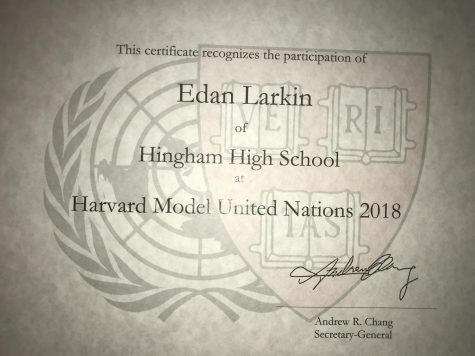
The certificates given to every delegate upon his or her completion of HMUN.
The busride home was somber and quiet. Staying awake was a battle. Despite never wanting to leave HMUN, I cannot deny that a part of me was desperate to get home and take a well-needed nap in my own bed for the first time since Wednesday night. As the excitement of the weekend began to wear off, it was replaced by an unavoidable fatigue.
When I was finally home and rested, I animatedly shared my newly acquired stories with my family. I could talk about the trip for hours. As I unpacked my bags and unveiled my various different items from HMUN, such as my nametag, placard, pins, and sweatshirt, I felt a rush of emotion. I already could barely wait for next January where I will once again return to HMUN.
“Firstly, I love that the students meet people from all over the world and they make friendships. That’s a really nice perk of the trip,” said Mrs. Black with a smile. ”But I also think it’s really impressive that students are tasked with dealing with big international dilemmas, things that even adults in positions of power are having a hard time dealing with. And here we have teenagers talking with other teenagers to figure out how to solve these problems. I think it shows an idea of what’s to come.”
I feel endlessly lucky to be able to have such an experience, and it is something I have never and will never take for granted. The memories made at HMUN are unlike any others. The entirety of HMUN is such special, remarkable event; nowhere else do so many students from so many places have the chance to form such unlikely yet strong friendships. I know next year will nothing short of unforgettable.






